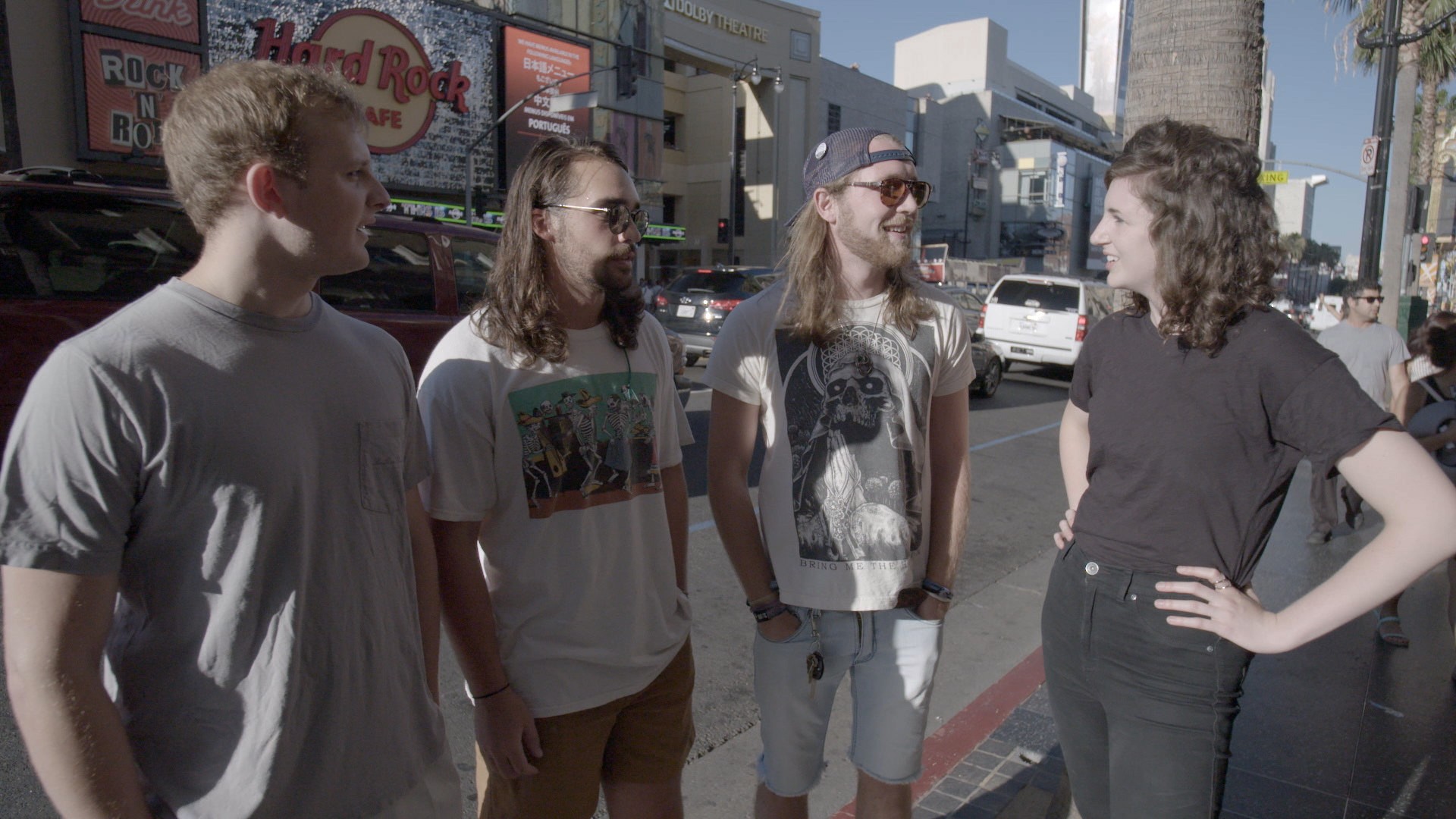When I was in middle school, I thought my life depended on my butt and my ability to do a back handspring. By high school, I accepted that the former would never look good in the cool jeans and the latter would never happen. I erected a mental barrier between myself and the cheerleaders I would never socialize with: If I couldn't be popular, I reasoned, I could become the proof that the popular kids were wrong. At some point, my emotional palette transitioned from despair and longing and loneliness to a thirst for vengeance and a superiority complex, and although I no longer care what my high school classmates are doing, I would be lying if I said this pattern hadn't repeated itself in college and in my early career. The signifiers have changed—though a good butt will still get you very far—but far from transcending the pettiness of the girls' locker room as adults promised me I would, I have come to understand that popularity is a darkly powerful force at play in basically any endeavor that involves interacting with another human.
Advertisement
This tension between the real value of popularity and how stupid and destructive it is as a goal is something Mitch Prinstein unpacks in his new book, Popular: The Power of Likability in a Status-Obsessed World, which came out yesterday from Viking. His central argument differentiates between two types of social currency: status and likability. Though both follow us throughout adolescence and into the workplace, he says, one can help us—even allowing us to live longer, research shows—while the quest for the other promises only more strife and gnashing of teeth. You can probably guess which is which. I spoke with Prinstein, who is also the director of clinical psychology at the University of North Carolina at Chapel Hill, over the phone about his book, how our status in school still affects us today, and why popularity is key to saving the world from the American political situation.
Watch on Broadly: Hollywood Bros Speak Their Minds:
VICE: Can you explain the two types of popularity you discuss in the book?
Mitch Prinstein: Likability is a kind of popularity we've all been drawn to since we were little kids, and it's true that those who are more likable really do have a number of benefits in all aspects of life. Even decades later, it's worth attempting to be likable—even as an adult. The second type is a type of popularity reflected by our status, influence, visibility, power, fame, and celebrity. Research clearly demonstrates that these are all things that lead to problems in the long run.
Watch on Broadly: Hollywood Bros Speak Their Minds:

VICE: Can you explain the two types of popularity you discuss in the book?
Mitch Prinstein: Likability is a kind of popularity we've all been drawn to since we were little kids, and it's true that those who are more likable really do have a number of benefits in all aspects of life. Even decades later, it's worth attempting to be likable—even as an adult. The second type is a type of popularity reflected by our status, influence, visibility, power, fame, and celebrity. Research clearly demonstrates that these are all things that lead to problems in the long run.
Advertisement
That's a very appealing idea, that status leads to problems.
Most people who are high in status are average or in fact disliked. Only about 30 percent of people who are high in status are also very high in likability. You can think of the celebrities who can fit that category, but that's the case also of politicians, CEOs, etc. The things that can easily get you high status are the exact things that make you disliked—aggressive behavior being the biggest one of those.You begin the book by talking about a horrible girl whom everyone hates but acknowledges is the most popular girl in school. Why are people so impressed by people they dislike?
It doesn't make perfect, rational sense, and that's because it stems from the way we're built biologically. Our brains are constructed in a way that made sense about 60,000 years ago, when it was important for us to be sensitive to being in the herd and having the protection and resources that came from being with others. The person in charge of that herd—the one who had the most access to the resources, was the most central, and determined who was in and who was out—was someone we were programmed to attend to, look toward, feel favorably toward. As we've evolved, we've developed more complex and mixed feelings about those same people.How does envy play into that?
That's a wonderfully complex human emotion that wouldn't have been relevant 60,000 years ago. We do have a strong tendency to build people up and then tear them down through that process of envy. It's why it's so important for people to focus not simply on dominating others or trying to seem better than they are, but to actually engage in likable behavior that helps others feel important and equal. Likability is not about a hierarchy as much as it is about feeling connected.
Most people who are high in status are average or in fact disliked. Only about 30 percent of people who are high in status are also very high in likability. You can think of the celebrities who can fit that category, but that's the case also of politicians, CEOs, etc. The things that can easily get you high status are the exact things that make you disliked—aggressive behavior being the biggest one of those.
"Most people who are high in status are average or in fact disliked."
It doesn't make perfect, rational sense, and that's because it stems from the way we're built biologically. Our brains are constructed in a way that made sense about 60,000 years ago, when it was important for us to be sensitive to being in the herd and having the protection and resources that came from being with others. The person in charge of that herd—the one who had the most access to the resources, was the most central, and determined who was in and who was out—was someone we were programmed to attend to, look toward, feel favorably toward. As we've evolved, we've developed more complex and mixed feelings about those same people.How does envy play into that?
That's a wonderfully complex human emotion that wouldn't have been relevant 60,000 years ago. We do have a strong tendency to build people up and then tear them down through that process of envy. It's why it's so important for people to focus not simply on dominating others or trying to seem better than they are, but to actually engage in likable behavior that helps others feel important and equal. Likability is not about a hierarchy as much as it is about feeling connected.
Advertisement
Photo by Somer Hadley, Revolution Studi. Courtesy of Penguin Random House
You talk about the importance of breaking the pattern of popularity that creates this sort of hierarchy—breaking the pattern of feeling trapped in one's status. Can you explain how you advise people to do that?
It's important for people to recognize when they're engaging in behaviors, like many of those on social media, that they think will get them the quick fix—many followers or likes or retweets, things that are superficial measures of status. Try and use social media to truly connect and to establish relationships and take an interest in things. Notice how much we're investing in each kind of popularity. I think it's [also] important to recognize how much your own behavior might be subject to biases that come from the way you were treated growing up. There is fascinating evidence that suggests folks who were not popular growing up continue to see the world as a hostile, rejecting place, even when presented objectively with information that is not rejecting or hostile.Can you explain the "popularity boomerang"?
Psychologists refer to this as the "transactional model," and it refers to the transactions we have with our environment—we put something out there, and the environment responds to us. Based on how the environment responds to us, we change and we modify. One of the reasons popularity plays an incredibly strong role in shaping the rest of our lives is that someone who is popular is being given opportunities to engage in different kinds of social interaction every single day. Popular people are being invited to more social gatherings; they're given opportunities to date more often, and have happier, positive types of interactions. Each of those interactions is a teaching opportunity for someone to learn more sophisticated skills. A rejected person is denied those opportunities—they lose out in each of those teaching moments, only causing them to fall behind and to potentially have more of a deficit socially.
It's important for people to recognize when they're engaging in behaviors, like many of those on social media, that they think will get them the quick fix—many followers or likes or retweets, things that are superficial measures of status. Try and use social media to truly connect and to establish relationships and take an interest in things. Notice how much we're investing in each kind of popularity. I think it's [also] important to recognize how much your own behavior might be subject to biases that come from the way you were treated growing up. There is fascinating evidence that suggests folks who were not popular growing up continue to see the world as a hostile, rejecting place, even when presented objectively with information that is not rejecting or hostile.Can you explain the "popularity boomerang"?
Psychologists refer to this as the "transactional model," and it refers to the transactions we have with our environment—we put something out there, and the environment responds to us. Based on how the environment responds to us, we change and we modify. One of the reasons popularity plays an incredibly strong role in shaping the rest of our lives is that someone who is popular is being given opportunities to engage in different kinds of social interaction every single day. Popular people are being invited to more social gatherings; they're given opportunities to date more often, and have happier, positive types of interactions. Each of those interactions is a teaching opportunity for someone to learn more sophisticated skills. A rejected person is denied those opportunities—they lose out in each of those teaching moments, only causing them to fall behind and to potentially have more of a deficit socially.
Advertisement
Can you talk a little bit about how popularity relates to "mating," to use an evolutionary term?
I would offer some caution. First of all, physical attractiveness is related to both likability and to status, more so to status. Joe Allen at the University of Virginia did a really interesting study where he showed that those who had high status grew up to think that the status of your mate was a very important attribute. When they were broken up with, they felt that it was probably because they weren't high status enough for their partner. I would strongly caution against the idea of your mate's status as being a marker of success because we have good reason to think that ultimately leads to disappointment, not only in the relationship but also in your feelings about yourself. But among teenagers, we know that dating someone of high status is a surefire way to try and increase your own status.Speaking of teenagers, why do these things feel most potent when you're in middle and high school?
Our brains are built to get us interested in autonomy. We can't live with our parents and be fed by them for our entire lives, so our brain prepares us for that separation by making our peers really cool and making our parents really lame. Because of that, we suddenly have this enhanced desire to do whatever we can to get our peers to approve of us and for us to feel a part of the overall peer group.What were your goals in writing this book?
I think there are some ways in which people can extract lessons from this, but the book is more about the science behind popularity and hopefully a kind of commentary on where we're headed as a society—and whether we're headed in the exact wrong direction. The changes over the past 100 or 50 years, or some would say since November, have been very rapid, alarming, and dangerous. I hope people come away from the book, in addition to thinking about how they can help themselves, thinking about whether we as a society are starting to change our values in a way that might hurt us in the long run.Do you think we are?
I think we are.Did you think Donald Trump would win in November?
I was too tied up in that emotionally. I am not at all surprised that he won. He has become the walking example of everything the book talks about—his insatiable desire for status. No matter what happens, he just wants more and more—if ever there were a lesson about why the pursuit of status only leads to the desire for more status and ultimately failure and despair, we now have that example.Follow Lauren Oyler on Twitter.Popular: The Power of Likability in a Status-Obsessed World by Mitch Prinstein is available in bookstores and online.
I would offer some caution. First of all, physical attractiveness is related to both likability and to status, more so to status. Joe Allen at the University of Virginia did a really interesting study where he showed that those who had high status grew up to think that the status of your mate was a very important attribute. When they were broken up with, they felt that it was probably because they weren't high status enough for their partner. I would strongly caution against the idea of your mate's status as being a marker of success because we have good reason to think that ultimately leads to disappointment, not only in the relationship but also in your feelings about yourself. But among teenagers, we know that dating someone of high status is a surefire way to try and increase your own status.
"Likability is not about a hierarchy as much as it is about feeling connected."
Our brains are built to get us interested in autonomy. We can't live with our parents and be fed by them for our entire lives, so our brain prepares us for that separation by making our peers really cool and making our parents really lame. Because of that, we suddenly have this enhanced desire to do whatever we can to get our peers to approve of us and for us to feel a part of the overall peer group.What were your goals in writing this book?
I think there are some ways in which people can extract lessons from this, but the book is more about the science behind popularity and hopefully a kind of commentary on where we're headed as a society—and whether we're headed in the exact wrong direction. The changes over the past 100 or 50 years, or some would say since November, have been very rapid, alarming, and dangerous. I hope people come away from the book, in addition to thinking about how they can help themselves, thinking about whether we as a society are starting to change our values in a way that might hurt us in the long run.Do you think we are?
I think we are.Did you think Donald Trump would win in November?
I was too tied up in that emotionally. I am not at all surprised that he won. He has become the walking example of everything the book talks about—his insatiable desire for status. No matter what happens, he just wants more and more—if ever there were a lesson about why the pursuit of status only leads to the desire for more status and ultimately failure and despair, we now have that example.Follow Lauren Oyler on Twitter.Popular: The Power of Likability in a Status-Obsessed World by Mitch Prinstein is available in bookstores and online.

